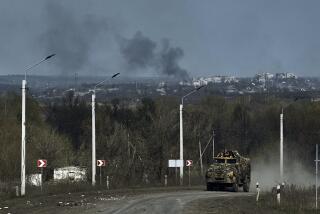POW Issue Threatens U.S.-Vietnam Ties : Diplomacy: American envoy will investigate latest report in Hanoi.
- Share via
WASHINGTON — Barely three months after a Senate committee concluded that there was no proof U.S. prisoners were left behind in Vietnam, the discovery of a Russian document has thrown the POW debate wide open again and raised new doubts about the prospect of normalized U.S.-Vietnam relations.
The Clinton Administration hopes retired Gen. John W. Vessey Jr., the special envoy who has been negotiating with Vietnam for information about the fate of still-missing American servicemen, will be given conclusive explanations of the authenticity of the document during two days of talks due to begin Monday in Hanoi.
The document is a Russian translation of what purports to be a secret 1972 report to the North Vietnamese Politburo on the real number of American prisoners of war then being held by the North Vietnamese. The Vietnamese have asserted that it is a forgery.
Discovered in February by Harvard University researcher Stephen Morris in the archives of the Soviet Communist Party in Moscow, the report says that 1,205 American prisoners were being held in 11 prisons in September, 1972--nearly three times the 368 POWs whom North Vietnam acknowledged holding at the time and more than twice the 591 who were repatriated only a few months later in the spring of 1973.
Vessey is to meet with senior Vietnamese officials, including Tran Van Quang, the retired Vietnamese general identified in the document as the author of the Politburo report. If the Vietnamese continue to insist the document is a fake, Vessey is prepared to ask for contemporaneous prisoner lists and the minutes of the Sept. 15, 1972, Politburo meeting where the Russian translation indicates the report was read, sources said.
“It won’t be easy,” said a source familiar with Vessey’s orders. “I would not expect that we, for instance, would turn over our National Security Council files to the Vietnamese. But that is what the Vietnamese are going to have to do in order to straighten all this out.”
That is also what the Vietnamese are going to have to do if they want the United States to lift an 18-year-old trade embargo or take other steps toward normalizing diplomatic relations, warned Sen. John Kerry (D-Mass.), chairman of the Senate committee that conducted the POW investigation.
The Vietnamese charge that the document was planted in the Russian archives to sabotage U.S.-Vietnamese relations. It is no coincidence, they suggest, that it was discovered only weeks before the Clinton Administration had been expected to lift the trade embargo in response to Hanoi’s efforts to account for missing servicemen.
Pentagon and State Department officials privately dismiss such theories, noting that a forged document could not have been planted in a secret Russian archive without the complicity of senior Russian officials, who have no conceivable reason for wanting to sabotage U.S.-Vietnamese relations.
On the contrary, Pentagon sources say, after Morris found the document, Russian authorities were divided over whether to hand it over.
But while they accept the document’s authenticity, Pentagon officials still question its accuracy.
The document asserts, for instance, that American POWs were moved to 11 different sites after an abortive U.S. raid on one prison near Hanoi in September, 1970. However, the evidence gathered by U.S. intelligence indicates that the Americans were consolidated into four prisons.
Even more suspiciously to some, the document makes repeated references to “South Vietnam” at a time when North Vietnamese documents and speeches invariably referred to the other side as the “puppet regime” in Saigon.
Dissenters believe most discrepancies can be accounted for by translation errors.
More to Read
Sign up for Essential California
The most important California stories and recommendations in your inbox every morning.
You may occasionally receive promotional content from the Los Angeles Times.













